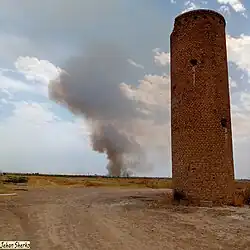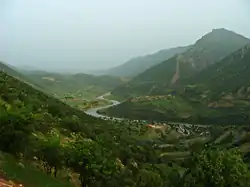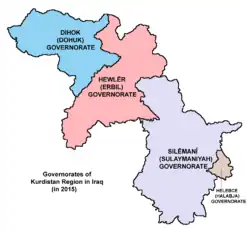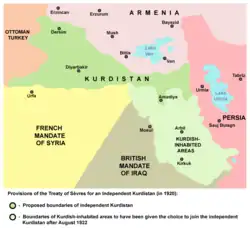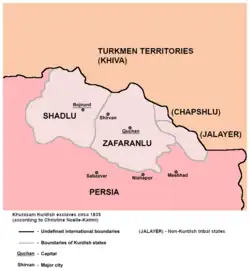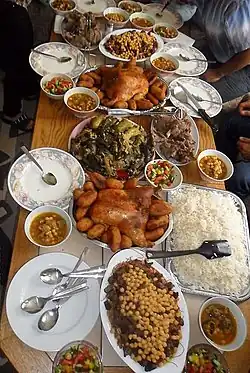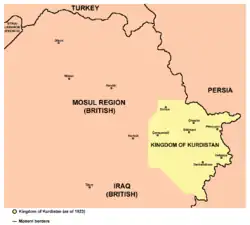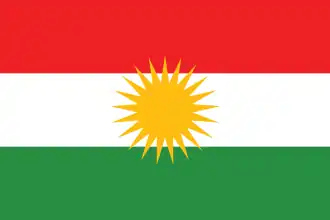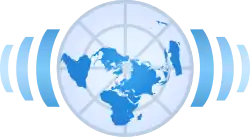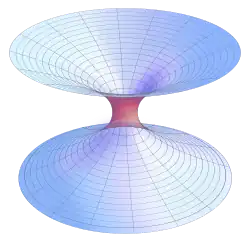Portal:Kurdistan
The Kurdistan Portal_box_inset_removed.jpg) Kurdistan (Kurdish: کوردستان, romanized: Kurdistan, lit. 'land of the Kurds'; [ˌkʊɾdɪˈstɑːn] ⓘ), or Greater Kurdistan, is a roughly defined geo-cultural region in West Asia wherein the Kurds form a prominent majority population and the Kurdish culture, languages, and national identity have historically been based. Geographically, Kurdistan roughly encompasses the northwestern Zagros and the eastern Taurus mountain ranges. Kurdistan generally comprises the following four regions: southeastern Turkey (Northern Kurdistan), northern Iraq (Southern Kurdistan), northwestern Iran (Eastern Kurdistan), and northern Syria (Western Kurdistan). Some definitions also include parts of southern Transcaucasia. Certain Kurdish nationalist organizations seek to create an independent nation state consisting of some or all of these areas with a Kurdish majority, while others campaign for greater autonomy within the existing national boundaries. The delineation of the region remains disputed and varied, with some maps greatly exaggerating its boundaries. Historically, the word "Kurdistan" is first attested in 11th century Seljuk chronicles. Many disparate Kurdish dynasties, emirates, principalities, and chiefdoms were established from the 8th to 19th centuries. Administratively, the 20th century saw the establishment of the short-lived areas of the Kurdish state (1918–1919), Kingdom of Kurdistan (1921–1924), Kurdistansky Uyezd i.e. "Red Kurdistan" (1923–1929), Republic of Ararat (1927–1930), and Republic of Mahabad (1946). In Iraq, following the Aylūl Revolt, the government entered into an agreement with the rebellious Kurds, granting Kurds local self-rule. Soon after, however, the agreement collapsed. Later, during the Iraqi no-fly zones conflict, which followed the Gulf War, the Iraqi military withdrew from parts of northern Iraq, allowing the Kurds to fill the vacuum and regain lost control in those areas. After the invasion of Iraq, and since the creation of the new Iraqi federal state, the new constitution issued in 2005 recognises Kurdistan Region as a federal region; even though the constitution does not include the term “autonomy”, it emphasises decentralisation and devolution, allowing regions and governorates to administer local affairs. In practice, however, only Kurdistan Region has exercised this authority granted by the constitution. In September 2017, Iraqi Kurds held a one-sided independence referendum, which eventually failed and was abandoned. The subsequent effort by the Iraqi government to punish Kurdistan Region has resulted in the latter losing authorities it had previously possessed, and the future of Kurdish autonomy in Iraq has been called into question. Iraqi Kurdish officials have also complained of efforts by the Iraqi government to return to the pre-2003 centralized government and dismantle Kurdistan Region altogether. There is also a Kurdistan province in Iran, which is not self-ruled. Kurds fighting in the Syrian civil war, under the banner of the Syrian Democratic forces, established the Democratic Autonomous Administration of North and East Syria (commonly called Rojava), a self-governing administration which seeks to retain its autonomy in a proposed federalized Syria. (Full article...) Selected article -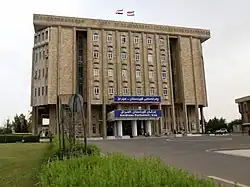 The Kurdistan Regional Parliament, also known as Kurdistan Parliament – Iraq (Kurdish: پەرلەمانی كوردستان; Arabic: برلمان اقليم كردستان), or simply Perleman, is the parliament of the Kurdistan Region in Iraq. It comprises representatives from various parties, lists or slates elected every four years by the inhabitants of the Kurdistan Region, which the Kurdistan Regional Government currently governs. In 2009, an amendment was applied to the Kurdistan Election Law of the year 1992, changing the name of the body to the Kurdish Parliament from its previous name: the Kurdish National Assembly. In February 2024, the Federal Supreme Court of Iraq invalidated several articles of the election law and simultaneously amended it, decreasing the number of seats in the parliament from 110 to 100, among other structural changes. The Parliament is a 100-member unicameral body in which 5 seats are reserved for non-Kurdish minority communities of the Kurdistan Region. The Parliament building is located in Erbil, the capital of the Kurdistan Region. (Full article...) General images -The following are images from various Kurdistan-related articles on Wikipedia.
Related portals'Religions in Kurdistan Arab states Other countries Selected picture.png) A coffee shop in Diyarbakır, 1905
Did you know
CategoriesSelect [►] to view subcategories
Kurdistan Iranian Kurdistan Iraqi Kurdistan Syrian Kurdistan Turkish Kurdistan Kurdish culture Events in Kurdistan Films set in Kurdistan Geography of Kurdistan Government of Kurdistan Region History of Kurdistan Kurdish people Languages of Kurdistan Massacres in Kurdistan Kurdish organisations Politics of Kurdistan Religion in Kurdistan Society of Kurdistan Sport in Kurdistan Kurdish studies Kurdistan stubs TopicsNew articlesThis list was generated from these rules. Questions and feedback are always welcome! The search is being run daily with the most recent ~14 days of results. Note: Some articles may not be relevant to this project.
Rules | Match log | Results page (for watching) | Last updated: 2025-08-18 20:17 (UTC) Note: The list display can now be customized by each user. See List display personalization for details.
Things you can do
Associated WikimediaThe following Wikimedia Foundation sister projects provide more on this subject:
Sources
Discover Wikipedia using portals
|
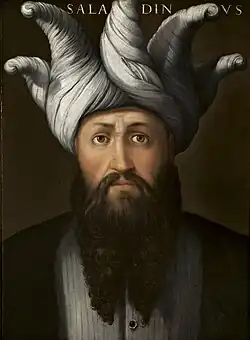

.jpg)
.svg.png)
